After passing through Aleppo, I have been getting used to the sight of military checkpoints. The coastal region is no exception in that matter, as the city of Lattakia witnessed anti-government manifestations and the brutal response of the regime some weeks ago.
The propaganda says that roughly 3000 persons killed during demonstrations countrywide were victims of "terrorist groups". The military, deployed all around here, is of course defending the people. Although the Arab League had requested the regime to withdraw the troops from the streets, and Syrian government finally agreed, there is no much hope for improvement. "Terrorists will kill more people and the army will come back to the cities", said a plainclothed security officer.
All around the country there were pro-government rallies being held, each day in another city. As I heard, people from countryside were being brought there in buses and given food, banners, flags and T-shirts for free. It is also suspected, that great number of them came from Alawi countryside, as the president himself is Alawi and favours that 9% religious minority. Easier access to scholarships and government jobs for Alawites makes the Sunni majority angry, as I was told. The danger is that in case of a real revolution taking place in Syria, this internal tension may escalate and become bloody.
Leaving Lattakia I tried to keep as close to the coast as possible, using smaller roads. The sea is occasionally visible, but the amount of rubbish makes a visit to the shore absolutely uninteresting. The land looks fertile, and among rows of few meters tall reeds there are greenhouses with tomatoes or orange groves scattered. Quite often I was stumbling upon military installations hidden in the bush, and unexpected sight of radar station with huge SAM missiles on their launchpads, located just next to the road, was quite impressive. At the accompanying military post my bike was decorated by a spare Syrian flag on a long bamboo pole. Tucked into rear panniers, it attracted even louder and more enthusiastic reactions along the road.
Quite close to Baniyas it started to get dark. Until that moment I had not spotted even a single place suitable for camping, and the nearest town with hotels that I knew about, was Tartus, some 50km further. I stopped to check the guidebook again, and then some boys from nearby car workshop asked me what I was doing there. The question about my plan for the night was obvious and appeared soon. When I mentioned a tent, one man from behind came forward and told that I could sleep in his house. I did not hesitate much.
A tiny, single floor, tin-roofed house had been hosting seven members of the family. At least I was told so, because I did not meet with the feminine part of it. As in every traditional Muslim house, the separation was almost absolute. I was given food and smoked narghile with my host. His two sons accompanied us, and 15 y.o. Mohammad was the only one to understand English. Being very expressive, he could also explain many things in Arabic combined with the sign language, when I was unable to understand his father. After that, he gave me his bed, sleeping himself on a mattress, and not allowing any discussion about swapping the places.
These wonderful people live out of the land, very modestly, planting tomatoes and oranges. They not only hosted and fed me there, but also asked, at the moment of the farewell, if I do need any money.
The pause of rain, that I had used to start off, finished quickly. And there was no further break. The rain continued until the next day, and with my clothes that had worn out quickly and were no more rainproof, I had to stay in Tartus for two nights. There I could witness shopping craziness preceding one of the biggest Islamic holidays: Eid al-Adha.
On the holiday, however, the sky cleared up. Happily, I left Tartus and soon hit a round number of 10,000km ridden. Using the map, I wanted to go to the border with Lebanon and follow it closely through minor roads. The look of the mountains on the other side was so tempting... But again the map proved to be quite inaccurate, and after seeing the border post I had to turn back to the highway. The trip across villages gave me, however, an insight into the celebrations. Families gathered in front of their houses, eating, chatting, drinking tea. I was constantly receiving invitations and free drinks. On the other side, the holiday included gifts for children. And the most popular gift for a boy appeared to be a gun shooting plastic balls. Guess, who was the perfect target for these little pests? Quickly I learned to carry few stones and backfire as quickly as possible. So the day was emotional shuffle: smiles and thanks for someone, and insults with stone throwing for another person just behind the corner. Quite tiresome.
The cherry on the top was the manager of a roadside stall. When I ordered coffee and some sweet cake, he not only refused to take any money from me, but also gave me a cool bottle of water.
On the next day I visited Qalaa al-Hosn, known also as Crac des Chevaliers. The merciless uphill leading there, especially when done before breakfast, made my legs tremble when walking at the edge of high defense walls. Indeed, the castle is big and situated on a prominent hill, which doubles the effect. Even though it was constructed for barbaric reasons, it looks great. And survived in good shape since the Middle Ages.
Double puncture slowed my progress on that day, and having done mere 30km I camped at the roadside. The next day I had to go past Homs and continue as far as possible in the direction of Palmyra.
The last news I had about Homs was a couple of days old. I knew that about 10 people had been killed there, and given that there is nothing interesting in that town, I decided to skip it. That was a good idea. Homs looked like being under siege. Every road leaving the highway, no matter how little and narrow, had a military checkpoint set up. What was going on inside of the city, was a mystery. However, on the Damascus highway I saw a military truck going in the other direction. It was pulling a platform trailer with a heap of twisted, sooted iron. It took me a while to figure out what it was. These were remains of a tank or other armoured vehicle, which had been blown up. I judged it by the caterpillars, as the rest was ripped and torn beyond any recognition. How such results could be obtained, I don't know, but for sure it takes more than stick and stones. Either it had been an accident or the internal conflict in Syria reaches new levels.
Not far eastwards the military checkpoints stopped appearing, and also the landscape changed. Olive and pine trees finished, and the desert came in. The air became dry, and the vegetation was reduced to tiny shrubs.
Then the sunset came. The landscape, dominated during the day by yellow sand and blue sky, exploded suddenly with colours. Thousand shades of oranges, purples and violets mixed together, faded one into another, danced together on the few clouds present on the otherwise spotless sky. Then, the spectacle finished even more abruptly as it had started. The colors died, faded out, and monochromatic, silver light of the moon lit the features of the terrain, giving them equal share of grey.
It was a day to the full moon, and with that light I could cycle on. Since the last crossroads the traffic was almost zero, so I rode with no headlight, using only the natural illumination. It was pure magic. Only the moon, the road and I, and the absolute silence whenever I stopped.
The magic, however, was struck down by harsh reality. I stopped for a dinner and just in the middle of the second sandwich I felt a sudden wave of chill and started shaking. Not only that. I also felt like frost was biting my hands. "What the hell?", I thought, "It cannot be!". I checked the thermometer. It said clearly +1.1°C, just to drop to +0.3°C a quarter later. Knowing that my camping equipment cannot give me enough warmth in sub-zero conditions, I pulled out all the warm clothes, jumped on the bike and regained thermal equilibrium after about ten kilometers. There was no way to camp, I had to go.
Somewhere in the middle of the way I dashed through a ghost town. There was a military base, but looked like it was deserted. No one at the gate, no one at watchtowers. A big, new radar base stood nearby. The road had been moved few dozens meters away, but still the big antenna, slowly rotating and scanning the sky, was in the range of a powerful stone throw. No fence, no single soldier around this valuable equipment. After having seen all these heavily guarded cities and villages, this looked unbelievable. Seems like the Syrian air defense might be caught off-guard again.
There was also a village around. The only one marked on the map, which otherwise showed the road going through empty space. And I knew that desert settlements can be accompanied by the real danger. Dogs. A village means food and they tend to stay somewhere around, even if living wild. On that day I had already fended off some of them by throwing stones. A single dog is easy to deal with, but in the night they often gather in packs. And desert dog is usually hungry and angry, and a pack of them is a serious danger.
And there they were. I heard barking of a single dog on my left. Then another one, third, fourth... More. Too many! They had already spotted me and were approaching, still being invisible in the darkness. I judged the distance to be about two hundred meters from the road. The conditions were in my favour: no wind, slight downhill. I could keep 30km/h with no effort, so I decided to run away. The leader followed me on the road for some time, but finally it worked. However, if anyone decides to do so, better be sure you can make it. A dog may reach speed of about 45km/h in few seconds and keep it for hundreds of meters. And escaping victim makes them even more crazy and determined to catch it.
Fortunately, that was the only encounter. Soon I was in empty lands again, and only some distant lights at the horizon disclosed remote human presence. With a light tailwind I could speed up, and also the temperature rose to acceptable levels.
The checkpoint I had spotted about half an hour before arriving there. The powerful flashlight used to inspect passing cars could be seen from kilometers away. However, having no engine and moving silently, I approached the post without being noticed by anyone except for the lone soldier standing outside the shelter. There was no flashlight, no single word spoken. The silence of the night was broken by the sound of a gun being loaded, and in the dim light I saw the guard taking aiming stance. Although I could not see it, it was clear where the barrel was being aimed at. There is no more international and universally understandable way of saying "stop". I pressed my brakes hard, and as soon as I planted my feet on the ground, I said loudly "Salaam aleykum!". The meaning of these words, "peace with you", seemed to fit perfectly this tense situation. The reaction was instant. I heard "Wa aleykum as-salaam", the gun lowered and was replaced by the flashlight brought by one of the soldiers who rushed out from the hut. Passport check, questions about the itinerary and quick inspection of panniers finished the formalities. Soldiers were absolutely astonished to see a cyclist coming there in the night. The guard himself apologized me for the unfortunate welcome and reminded to avoid the dogs.
That was enough of adventures on this desert ride. The remaining kilometers passed with no incidents and I reached Tadmur just before midnight, having my new record of 193km on the counter.

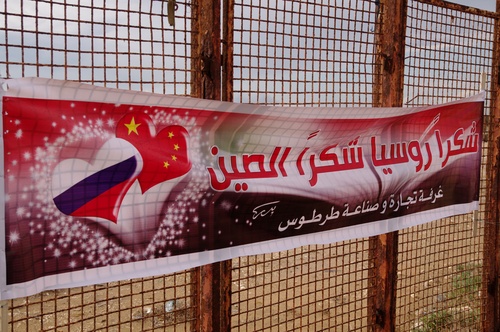
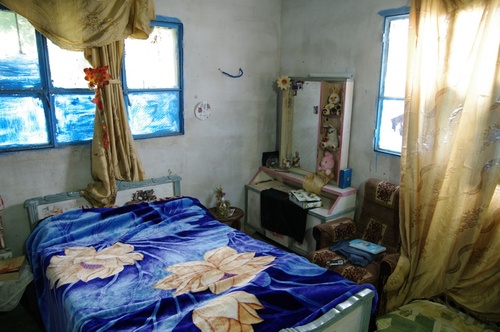
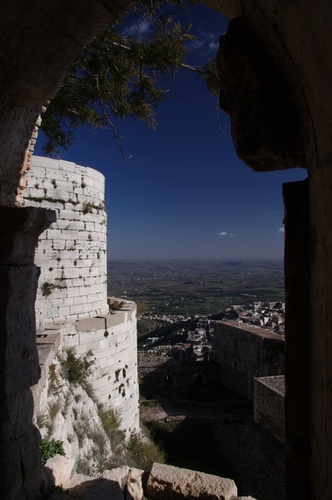
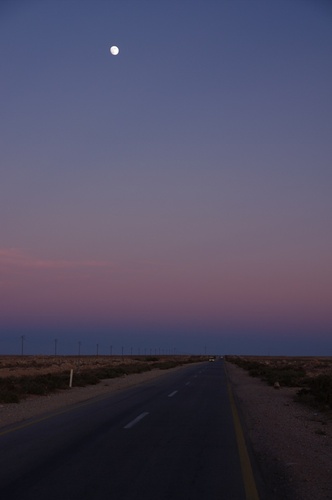


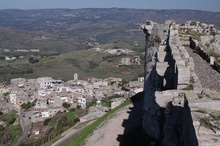
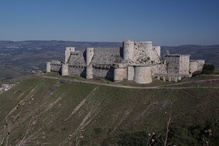
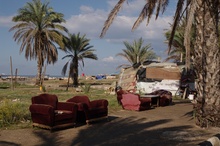
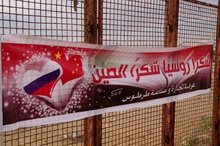
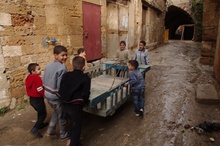
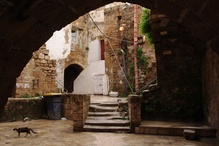
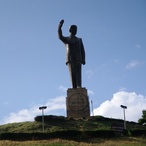
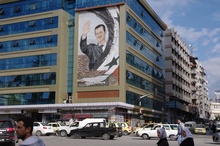
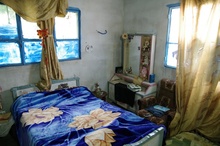
Comments:
mama
Jacek
h
kaha
Film "Rambo - Pierwsza Krew" był oparty na wydarzeniach z obozu harcerskiego na którym był w dzieciństwie Chuck Norris.
http://kawaly-o-chucku-norrisie.net76.net/
Chris
teodor